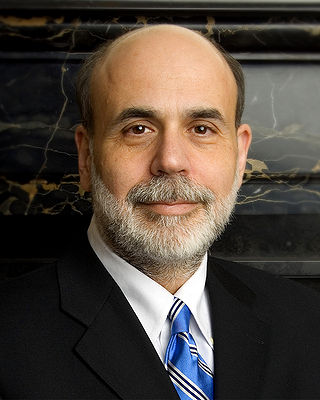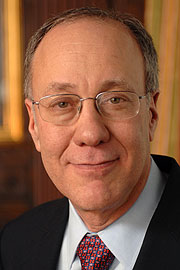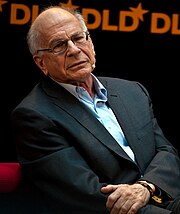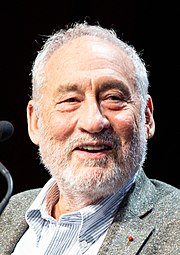
Economic history is the study of history using methodological tools from economics or with a special attention to economic phenomena. Research is conducted using a combination of historical methods, statistical methods and the application of economic theory to historical situations and institutions. The field can encompass a wide variety of topics, including equality, finance, technology, labour, and business. It emphasizes historicizing the economy itself, analyzing it as a dynamic entity and attempting to provide insights into the way it is structured and conceived.

An economist is a professional and practitioner in the social science discipline of economics.

Robert Emerson Lucas Jr. was an American economist at the University of Chicago. Widely regarded as the central figure in the development of the new classical approach to macroeconomics, he received the Nobel Memorial Prize in Economic Sciences in 1995 "for having developed and applied the hypothesis of rational expectations, and thereby having transformed macroeconomic analysis and deepened our understanding of economic policy". N. Gregory Mankiw characterized him as "the most influential macroeconomist of the last quarter of the 20th century". In 2020, he ranked as the 10th most cited economist in the world.
The Chicago school of economics is a neoclassical school of economic thought associated with the work of the faculty at the University of Chicago, some of whom have constructed and popularized its principles. Milton Friedman and George Stigler are considered the leading scholars of the Chicago school.

Aaron Ciechanover is an Israeli biologist who won the Nobel Prize in Chemistry for characterizing the method that cells use to degrade and recycle proteins using ubiquitin.

Ben Shalom Bernanke is an American economist who served as the 14th chairman of the Federal Reserve from 2006 to 2014. After leaving the Federal Reserve, he was appointed a distinguished fellow at the Brookings Institution. During his tenure as chairman, Bernanke oversaw the Federal Reserve's response to the 2007–2008 financial crisis, for which he was named the 2009 Time Person of the Year. Before becoming Federal Reserve chairman, Bernanke was a tenured professor at Princeton University and chaired the Department of Economics there from 1996 to September 2002, when he went on public service leave. Bernanke was awarded the 2022 Nobel Memorial Prize in Economic Sciences, jointly with Douglas Diamond and Philip H. Dybvig, "for research on banks and financial crises", more specifically for his analysis of the Great Depression.

Jean Tirole is a French economist who is currently a professor of economics at Toulouse 1 Capitole University. He focuses on industrial organization, game theory, banking and finance, and psychology. In particular, he focuses on the regulation of economic activity in a way that does not hinder innovation while maintaining fair rules.
The MIT Department of Economics is a department of the Massachusetts Institute of Technology in Cambridge, Massachusetts.

Bengt Robert Holmström is a Finnish economist who is currently Paul A. Samuelson Professor of Economics (Emeritus) at the Massachusetts Institute of Technology. Together with Oliver Hart, he received the Central Bank of Sweden Nobel Memorial Prize in Economic Sciences in 2016.

Eric Stark Maskin is an American economist and mathematician. He was jointly awarded the 2007 Nobel Memorial Prize in Economic Sciences with Leonid Hurwicz and Roger Myerson "for having laid the foundations of mechanism design theory". He is the Adams University Professor and Professor of Economics and Mathematics at Harvard University.

Roger Bruce Myerson is an American economist and professor at the University of Chicago. He holds the title of the David L. Pearson Distinguished Service Professor of Global Conflict Studies at The Pearson Institute for the Study and Resolution of Global Conflicts in the Harris School of Public Policy, the Griffin Department of Economics, and the College of the University of Chicago. Previously, he held the title The Glen A. Lloyd Distinguished Service Professor of Economics. In 2007, he was the winner of the Sveriges Riksbank Prize in Economic Sciences in Memory of Alfred Nobel with Leonid Hurwicz and Eric Maskin for "having laid the foundations of mechanism design theory". He was elected a Member of the American Philosophical Society in 2019.

The Nobel Memorial Prize in Economic Sciences, officially the Sveriges Riksbank Prize in Economic Sciences in Memory of Alfred Nobel, is an economics award funded by Sveriges Riksbank and administered by the Nobel Foundation.

The Committee for the Sveriges Riksbank Prize in Economic Sciences in Memory of Alfred Nobel is the prize committee for the Nobel Memorial Prize in Economic Sciences, and fills the same role as the Nobel Committees do for the Nobel Prizes. This means that the committee is responsible for proposing laureates for the prize. The Committee for the Prize in Economic Sciences in Memory of Alfred Nobel is appointed by the Royal Swedish Academy of Sciences. It usually consists of Swedish professors of economics or related subjects who are members of the academy, although the academy in principle could appoint anyone to the committee. Two of the members of the founding committee as well as later members of the committee had also been associated with the Mont Pelerin Society.

Douglas Warren Diamond is an American economist. He is the Merton H. Miller Distinguished Service Professor of Finance at the University of Chicago Booth School of Business, where he has taught since 1979. Diamond specializes in the study of financial intermediaries, financial crises, and liquidity. He is a former president of the American Finance Association (2003) and the Western Finance Association (2001-02).

Philip Hallen Dybvig is an American economist. He is the Boatmen's Bancshares Professor of Banking and Finance at the Olin Business School of Washington University in St. Louis.
The 2022 Nobel Memorial Prize in Economic Sciences was divided equally between the American economists Ben S. Bernanke, Douglas W. Diamond, and Philip H. Dybvig "for research on banks and financial crises" on 10 October 2022. The award was established in 1968 by an endowment "in perpetuity" from Sweden's central bank, Sveriges Riksbank, to commemorate the bank's 300th anniversary. Laureates in the Memorial Prize in Economics are selected by the Royal Swedish Academy of Sciences. The Nobel Committee announced the reason behind their recognition, stating:
"This year's laureates in the Economic Sciences, Ben Bernanke, Douglas Diamond and Philip Dybvig, have significantly improved our understanding of the role of banks in the economy, particularly during financial crises. An important finding in their research is why avoiding bank collapses is vital."




















